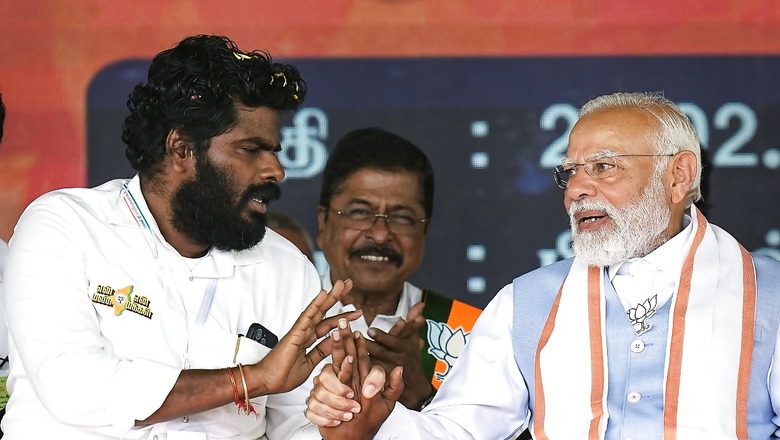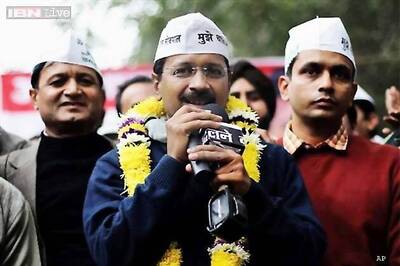
views
Coimbatore Lok Sabha seat will witness a high-stakes battle in the first phase of the Lok Sabha elections scheduled to be held on April 19, with Tamil Nadu BJP president K Annamalai facing DMK leader Ganapathy P Rajkumar and AIADMK’s Singai Ramachandran.
Coimbatore Lok Sabha Constituency comprises the Palladam, Sulur, Kavundampalayam, Coimbatore (North), Coimbatore (South) and Singanallur assembly segments. The sitting Coimbatore MP is PR Natarajan of the Communist Party of India (Marxist).
Voting Factors
- CPI(M): The CPI(M) is the incumbent party in the Coimbatore Lok Sabha seat. The sitting MP is PR Natarajan who is one of the only two CPM MPs from Tamil Nadu. CPM is in alliance with the DMK, which is hoping to make inroads in the Kongu region.
- DMK: DMK’s decision to contest from the Coimbatore instead of CPM could have a significant impact on voting in the region. Left parties have represented Coimbatore seven times since 1957, and the CPM has a strong cadre base in the industrial belt. DMK, on the other hand, has not won the Coimbatore Lok Sabha seat since 1996.
- Ground reports indicate a considerable amount of anti-incumbency against the sitting MP. There are allegations that Natarajan does not have a good connect with all his constituents, and that his trade unionist interventions in the industrial areas have upset entrepreneurs.
- It is possible that DMK’s decision to contest in place of CPM could help consolidate the anti-AIADMK and anti-BJP votes. Stalin’s overall popularity will also contribute to DMK’s image and could help the party make inroads in Coimbatore.
- BJP: The BJP has been a dominant player in Coimbatore and has won the Lok Sabha seat once in 1999. In the past two Lok Sabha elections, the party has come second, once contesting in alliance with AIADMK. It also controls the Coimbatore South Assembly segment which had elected firebrand leader Vanathi Srinivasan.
- Ground reports suggest that without an alliance with AIADMK this time BJP is slightly weakened. But the anti-incumbency against the sitting MP could work in its favour.
- AIADMK: The AIADMK had benefitted hugely from the tie-up with BJP in Coimbatore in 2021. It holds five of the six Assembly segments. The party has traditionally had a pretty strong base in Kongu region.
- Congress: Congress is not a major player in Coimbatore. But it still commands around 4-5% votes, which will help the DMK-led alliance.
- MNM: The 2019 Lok Sabha election saw Kamal Haasan’s MNM emerge as a significant force in Coimbatore. Its candidate Dr. R. Mahendran secured 11.6% of the vote. MNM is not contesting the elections this time, and its very well possible that some of its voters may go with the DMK-alliance.
- Regionalism: Coimbatore is part of the Kongu region, which has historically been a stronghold of the AIADMK. The Kongu region is home to a large population of Gounders, a dominant caste that has traditionally supported the AIADMK.
- Urban-Rural Divide: Coimbatore is a major urban center, while the surrounding areas are more rural. Urban voters tend to be more supportive of the DMK, while rural voters tend to support the AIADMK.
Electorate Composition
Total Voters (as of 2019 Parliament Election): 1,958,577
Rural Voters: 340,792 (approx. 17.4%)
Urban Voters: 1,617,785 (approx. 82.6%)
Scheduled Caste (SC) Voters: 260,491 (approx. 13.3%)
Scheduled Tribe (ST) Voters: 5,876 (approx. 0.3%)
Religious Composition
Hindu: 88.9%
Christian: 5.06%
Muslim: 5.92%
Key Issues in the Constituency
- Anti-Incumbency: On ground, reports suggest anti-incumbency against the current CPM MP. There are also allegations of corruption against the local administration and the state government. Natarajan is said to have lost touch with the needs of the constituents.
- Unhappy Industrialists: According to on-ground reports, the rise of the electricity rates and the issue of GST compliance has made the industrial sector unhappy. The energy consumption charges have been increased from Rs 6.35 a unit to Rs 7.50 a unit and fixed charges have been increased to Rs 75 to Rs 550 a kVA a month. This has had a big impact on the 15,000-20,000 cottage industries in the constituency.
- Tax issues: Industrial areas like Tiruppur have also struggled with GST. MSMEs have always been the backbone of the economy in both Coimbatore and Tiruppur. But they are still struggling from the effects of demonetisation and GST compliance issues. This has angered business owners.
- There have been major issues of tax evasion. On June 15, 2023, GST Intelligence unearthed evidence of a firm issuing Rs 97 crore worth of fake invoices and availing Rs 13 crore as Input Tax Credit fraudulently. In 2021, a timber merchant faced accusations of GST evasion to the tune of Rs 8 crore. This has inevitably put the focus on corruption and intermingling of state officials with major businessmen in the constituency.
- Unemployment and Economic Growth: Coimbatore faces a significant unemployment challenge. According to the Centre for Monitoring Indian Economy (CMIE), Coimbatore’s unemployment rate stood at 7.3% in December 2023, higher than the national average of 6.1%. This high unemployment rate is particularly concerning among the youth, who constitute a large proportion of the workforce.
- The constituency requires investment in industries such as manufacturing, IT, and tourism to create employment opportunities. For example, the government has announced plans to establish a textile park in Coimbatore, which is expected to create over 10,000 jobs. Additionally, the development of the Coimbatore Airport as a cargo hub has boosted economic growth and created employment opportunities in the logistics sector.
- Water Scarcity: Water scarcity is a major concern in Coimbatore, especially during the summer months. The city relies heavily on groundwater extraction, leading to declining water levels. In April 2023, the Coimbatore Corporation implemented water rationing, restricting water supply to certain areas for specific hours.
- Failing Infrastructure: Coimbatore’s rapid urbanization has led to increased traffic congestion and strain on infrastructure. The Coimbatore Metro Rail project was expected to significantly improve public transportation and reduce traffic congestion. However, according to ground reports no Metro work has been done in the constituency yet, which has made the constituents increasingly unhappy.
- Corruption and Governance: Allegations of corruption in local administration has been a concern for voters in Coimbatore. In March 2023, the Directorate of Vigilance and Anti-Corruption (DVAC) arrested several officials of the Coimbatore Corporation for alleged corruption in the award of public contracts. The corporation is controlled by DMK.
- Environmental Concerns: Coimbatore faces high levels of air pollution due to industrial emissions and vehicular traffic. In January 2023, the Central Pollution Control Board (CPCB) ranked Coimbatore as the most polluted city in Tamil Nadu in terms of air quality. However, on ground reports suggest that pollution as an electoral issue has been confined to the rural areas. But with a 17.4% rural population it will play a big role in the constituency.
- Communal Harmony: Coimbatore has experienced occasional incidents of communal tension, particularly during religious festivals. In July 2023, the district administration imposed prohibitory orders to prevent communal clashes during a religious procession. On ground reports suggests, that while communal tensions have not simmered into physical altercations, they remain a strong dividing line for the voters.
Infrastructure Development
- Kumaraguru College of Technology (KCT) Knowledge Centre: The knowledge centre will provide a conducive environment for global players to establish workspaces and research and development centers, potentially creating direct employment for 6,000 and indirect employment for 2,000 people. It will enhance Coimbatore’s status as a tech hub and attract investment in the IT sector, fostering economic growth and employment opportunities.
- KGISL IT Park: The establishment of a Rs 1000-crore world-class IT park by KGISL Infrastructures is expected to increase exports by 25% and create an additional 15,000 employment opportunities. It will also contribute significantly to the city’s annual turnover, fostering economic development.
- Improving Roads: The state government has been improving road infrastructure and enhancing connectivity within the city. The renovation and repair of damaged roads has improved traffic but congestion issues remain
- Coimbatore Smart City Projects: The central initiative includes lake rejuvenation, development, and digital transformation. Approximately 90% is completed. The Smart City projects aim to enhance the quality of life for Coimbatore residents by revitalizing urban spaces, improving infrastructure, and promoting sustainable development.
- Modernisation of Bhavanisagar Dam: This central government led project aims to modernize the Bhavanisagar Dam, which will significantly enhance irrigation facilities in Coimbatore and neighbouring districts, including Erode, Tiruppur, and Karur. The increased irrigation capacity will lead to improved agricultural productivity, benefiting local farmers and contributing to food security in the region.

















Comments
0 comment